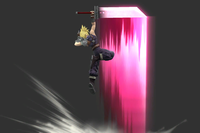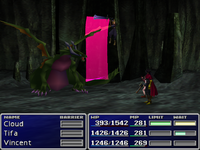Climhazzard: Difference between revisions
(→Origin) Tag: Mobile edit |
(→Origin) Tag: Mobile edit |
||
| Line 37: | Line 37: | ||
==Origin== | ==Origin== | ||
[[File:ClimhazzardOriginPic.png|thumb|left|Climhazzard in ''Final Fantasy VII''.]] | [[File:ClimhazzardOriginPic.png|thumb|left|Climhazzard in ''Final Fantasy VII''.]] | ||
[https://finalfantasy.fandom.com/wiki/Climhazzard_(Final_Fantasy_VII) Climhazzard] (called [https://finalfantasy.fandom.com/wiki/Ascension_(VII_Remake) Ascension] in the English version of ''Final Fantasy VII Remake'') is Cloud's second level 2 Limit Break in ''Final Fantasy VII''. When used, Cloud stabs an enemy and then performs a jumping slash that inflicts 4.375 times | [https://finalfantasy.fandom.com/wiki/Climhazzard_(Final_Fantasy_VII) Climhazzard] (called [https://finalfantasy.fandom.com/wiki/Ascension_(VII_Remake) Ascension] in the English version of ''Final Fantasy VII Remake'') is Cloud's second level 2 Limit Break in ''Final Fantasy VII''. When used, Cloud stabs an enemy and then performs a jumping slash that inflicts 4.375 times the damage of a normal physical attack to one enemy. The downward strike may be based on his first Limit Break called Braver, as well as one of the finishing blows in some portrayals of Climhazzard (like in the ''Dissidia'' games). | ||
{{clrl}} | {{clrl}} | ||
Revision as of 21:55, August 29, 2021
| Climhazzard | |
|---|---|
{{{content1}}}
{{{content2}}} Cloud using the normal and Limit Break versions of Climhazzard. | |
| User | Cloud |
| Universe | Final Fantasy |
Climhazzard (クライムハザード, Climb Hazard) is Cloud's up special move.
Overview
Cloud jumps into the air with his sword, and then back down if the action is immediately repeated.
Cloud thrusts his sword forward, dealing 3% damage. He is then propelled a distance about the height of Battlefield's top platform (this deals 4%). During this slash, Cloud can only grab ledges during the initial thrust, or when Cloud reaches its peak, much like Rising Uppercut. This, in addition to the slash giving mediocre distance and completely stopping Cloud's forward momentum on use, makes the standard Climhazzard a notoriously weak recovery if Cloud lacks his second jump or cannot use his wall jump.
If the button is pressed again, Cloud will fall continuously and slash downward. This downward slash deals 4.5% by itself, and 3.5% if Cloud lands on a platform. The downward slash will meteor smash the opponent most of the time, but if it lands behind Cloud or anywhere not directly below the sword, it will instead send opponents at a diagonal angle, with extremely high base knockback (enough to KO at 0% at the ledge in rare cases) but low scaling.
While Cloud is under Limit Break status (see Limit Charge), the initial stab deals 6% and the rising slash deals 7% with increased knockback. This variant propels Cloud 1.5 times higher than the original height and has good horizontal maneuverability on the rise, while additionally being able to carry Cloud's forward momentum as he falls. It will also allow grabbing the ledge while it is in progress. However, Cloud players should be wary of using this variant of the move on stages where the main platform has an underside, as the horizontal component may get them stuck in a fatal position.
Common to both versions, if Cloud inputs for the downward slash, he cannot grab the ledge until after descending a distance slightly less than Climhazzard's normal upward distance; grabbing the ledge while facing the opposite direction requires slightly less than Climhazzard's Limit Break upward distance before the ledge can be grabbed. Attempting to grab the ledge at any lower heights will cause a self-destruct. Any horizontal momentum is utterly cancelled if the falling slash is initiated. Repeated use of the downward slash near the ledge at a grabbable height is a viable edgeguarding option, as it can hit below the ledge before Cloud grabs it. If the downward slash's meteor smash hitbox is instead used as a Sacrificial KO, Cloud will almost always lose his stock first, unless the opponent is close enough to the bottom blast line or has high enough damage.
In Smash 4 only, if Cloud is hit near the apex of Climhazzard (Limit Break version or not) and tumbles, he is unable to perform any kind of tech to stop the knockback he sustained, usually leading to a KO. However, he is allowed to tech if he was hit more than once, was grabbed and then launched, or if his damage is over 100% and he does the reeling animation instead.
Instructional quote
| Thrusts his sword and then jumps into the air. Plunges with a high-speed cut if pressed again. |
Customization
Special Move customization was added in Super Smash Bros. 4. These are the variations:
| 1. Climhazzard |
|---|
| "Thrust your sword and then jump into the air. Push the button again for a high-speed downward cut." |
- Climhazzard: Default.
Like the other DLC characters, Cloud lacks custom move variations.
Origin
Climhazzard (called Ascension in the English version of Final Fantasy VII Remake) is Cloud's second level 2 Limit Break in Final Fantasy VII. When used, Cloud stabs an enemy and then performs a jumping slash that inflicts 4.375 times the damage of a normal physical attack to one enemy. The downward strike may be based on his first Limit Break called Braver, as well as one of the finishing blows in some portrayals of Climhazzard (like in the Dissidia games).
Gallery
Climhazzard as shown by the Move List in Ultimate.
Names in other languages
Trivia
- Cloud will enter helplessness after a full second of the falling slash animation (enough time to descend from the upper blast line of Gaur Plain to out-of-sight on the bottom screen). Unless in Smash Run or a stage even larger than Gaur Plain, this has no probable practical applications as Cloud maintains his dooming speed.
- In effect, this move is very similar to Ike's Aether, or Kirby's Final Cutter, though the downward swing in Cloud's case is purely optional, and potentially hazardous off-stage.
- Like Little Mac's KO Uppercut, the camera zoom effect from a Limit Break Climhazzard will not appear if Cloud is hit on the exact frame the move connects against an opponent.




